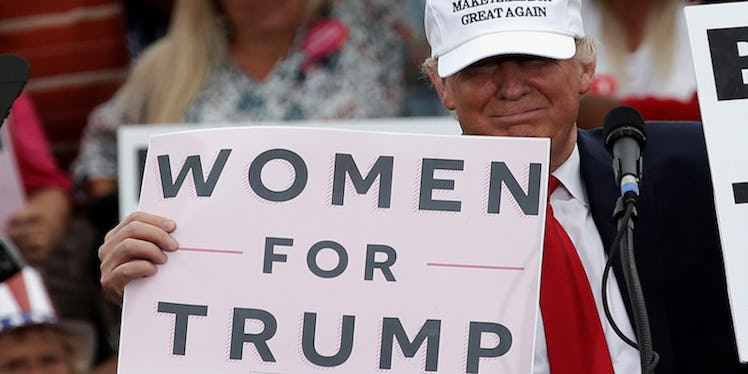Hillary Clinton made history when, in a speech she gave in Beijing, she said, “If there is one message that echoes forth from this conference, it is that human rights are women's rights...And women's rights are human rights. Let us not forget that among those rights are the right to speak freely. And the right to be heard."
This seemingly obvious statement reverberated around the world and still resonates today, where it's immortalized through Facebook statuses, internet memes and feminist graphic tees. And not much has changed since then — Hillary continues to make strides for the advancement of women, although we still have a long way to go in that arena.
Fortunately, issues affecting women are front and center in this year's presidential election, and modern technology gives us the ability to learn candidates' positions on these topics with just a few clicks.
Even the most superficial familiarity with Donald Trump reveals the troubling relationship he has long had with women and the issues that they care about.
Here's why a win for Trump will mean a loss for women.
He called for defunding Planned Parenthood.
Since kicking off his campaign, Donald Trump has defined himself as anti-choice and consistently vowed to defund Planned Parenthood if he becomes president. During the third presidential debate, he again affirmed his position when he stressed that Roe v. Wade would be overturned if he becomes president. "That'll happen automatically, in my opinion, because I am putting pro-life justices on the court," he said.
His intention to cut Planned Parenthood's government funding means that fewer women (and men!) will have access to the STD testing, affordable birth control and cancer screenings that the organization provides.
He thinks the wage gap can be solved if women simply "do as good a job" as men.
For Trump, equal pay for equal work is by no means a priority issue.
There's this, though: He did tell a female audience member at a New Hampshire speaking engagement that “you're gonna make the same if you do as good a job.” Those really aren't the words of a candidate with a strategic plan to close the wage gap, let alone one who has taken the time to fully understand why it exists.
Even more concerning is the recent Boston Globe report that revealed the Trump campaign paid female staffers one-third less than their male counterparts on average.
His public disagreements with women have all-too-often ended in misogynistic name-calling.
Like most public figures, Donald Trump has been involved in his fair share of feuds. Unlike most, he tends to resort to juvenile name-calling, frequently regarding the physical appearances of the women he quarrels with.
In 2015, he called Arianna Huffington “a dog” on Twitter while accusing her of making disparaging remarks about him. His ongoing feud with Rosie O'Donnell was exacerbated in 2006 when he famously called her a “big, fat pig” in a FOX news interview. (In a truly bizarre rant, he attacked her again during the first presidential debate in September.)
In addition to ridiculing former Miss Universe Alicia Machado about her weight, Trump repeatedly referred to the beauty queen as "Miss Housekeeping," playing off an untrue and incredibly offensive stereotype.
When, during a 2015 Republican debate, moderator Megyn Kelly posed a question about Trump's history of slurs against women, he responded by suggesting that she had “blood coming out of her wherever.”
Misogyny and gross immaturity aside, Trump's treatment of women begins to have more dangerous implications once we anticipate the situations he'll face if elected president. He couldn't even control his impulsivity during the third presidential debate, when he interrupted Hillary, calling her a "nasty woman." It begs the question: How would he handle high-pressure negotiations with foreign leaders (female or otherwise)?
This is a man whose first instinct when feeling attacked is to publicly imply that a debate moderator is menstruating. Enough said.
His website barely mentions issues that affect women.
In Donald Trump's public speaking engagements, from debates to rallies to TV interviews, he often encourages people to visit his website for a full list of his positions on today's most important issues. However, a quick scroll through his site reveals that reproductive rights, equal pay and affordable birth control are noticeably absent.
Come on. It's 2016. Women are breadwinners, not to mention leaders in business, politics, science and social change. We wield power in every major industry, and, in November, we'll use that influence at the voting booth.
How is it possible that issues affecting our paychecks, health and dignity aren't deemed critical enough to warrant a tab on Trump's website?
He condones bragging about sexual assault, saying it's just "locker room talk."
Donald Trump has repeatedly defended his comments about groping and kissing women without their consent, maintaining they were just "locker room talk." Many professional athletes have publicly called out Trump for attempting to defend his indefensible language.
There is, of course, no defense for the disgusting words Trump used. What's more, with so many women — and men — dealing with sexual assault and violence every day, it's not just wrong, it's downright dangerous to make comments that feed into rape culture and the objectification of entire groups of people.
PAID FOR BY WOMEN VOTE! WWW.WOMENVOTEPROJECT.ORG. NOT AUTHORIZED BY ANY CANDIDATE OR CANDIDATE'S COMMITTEE.
